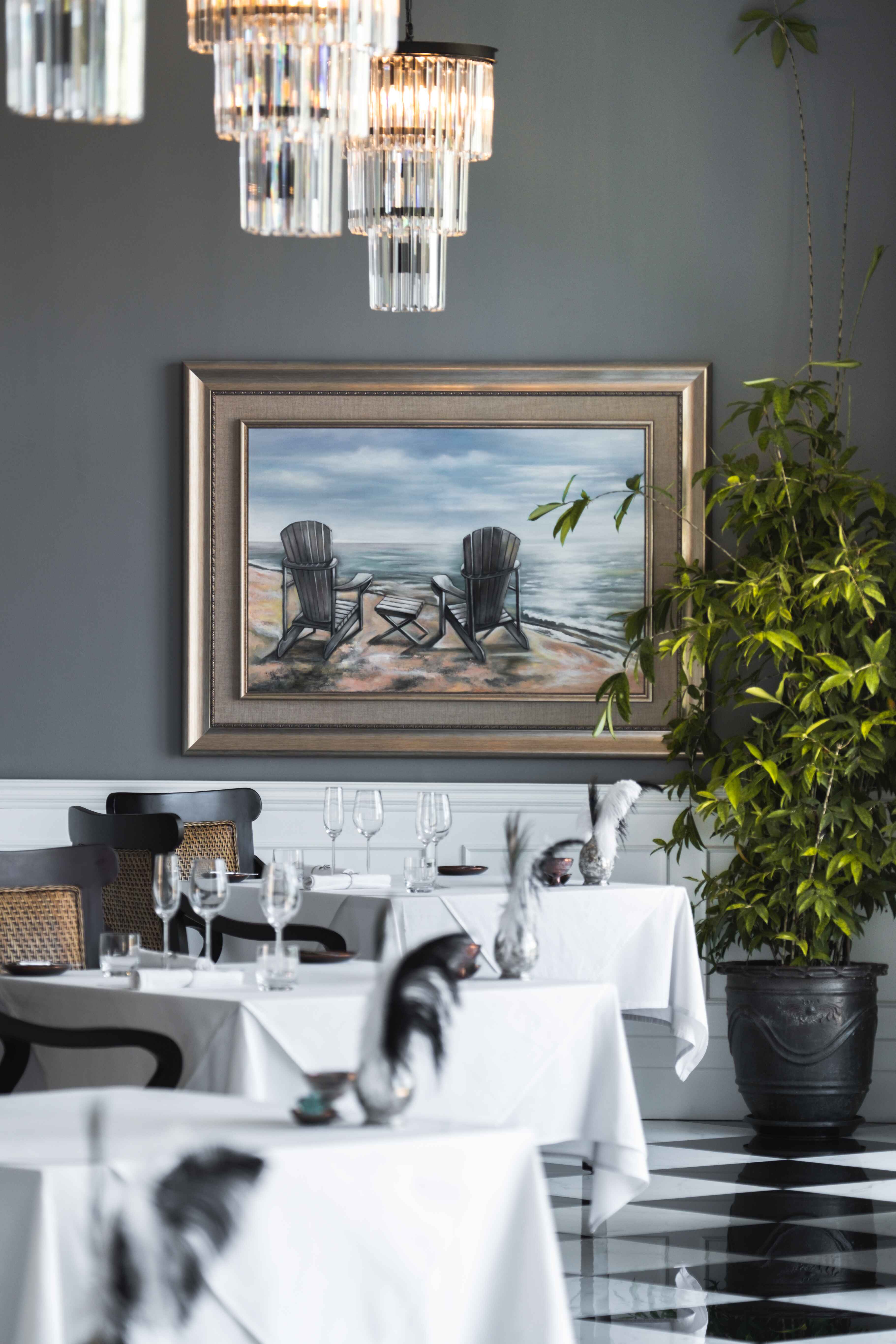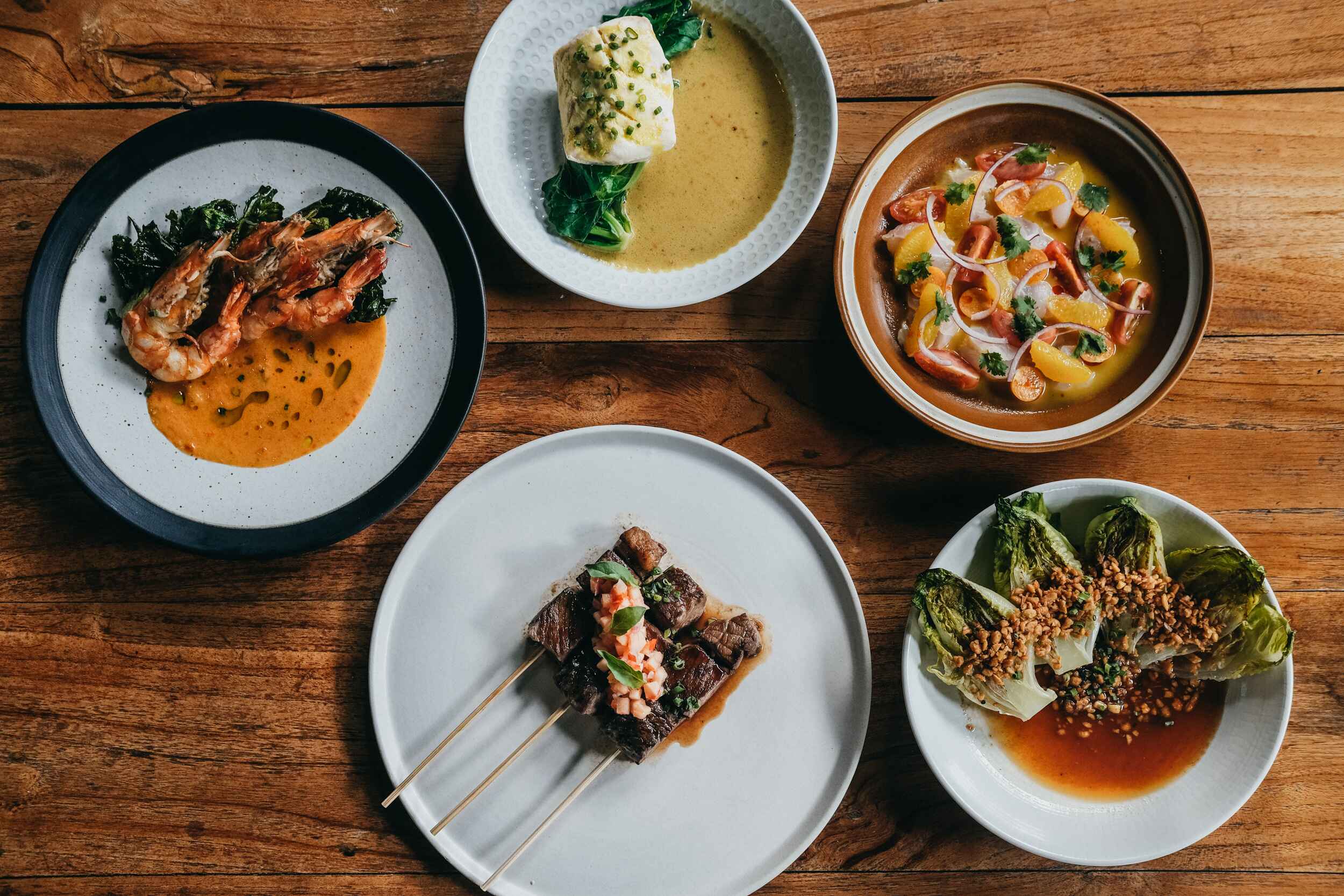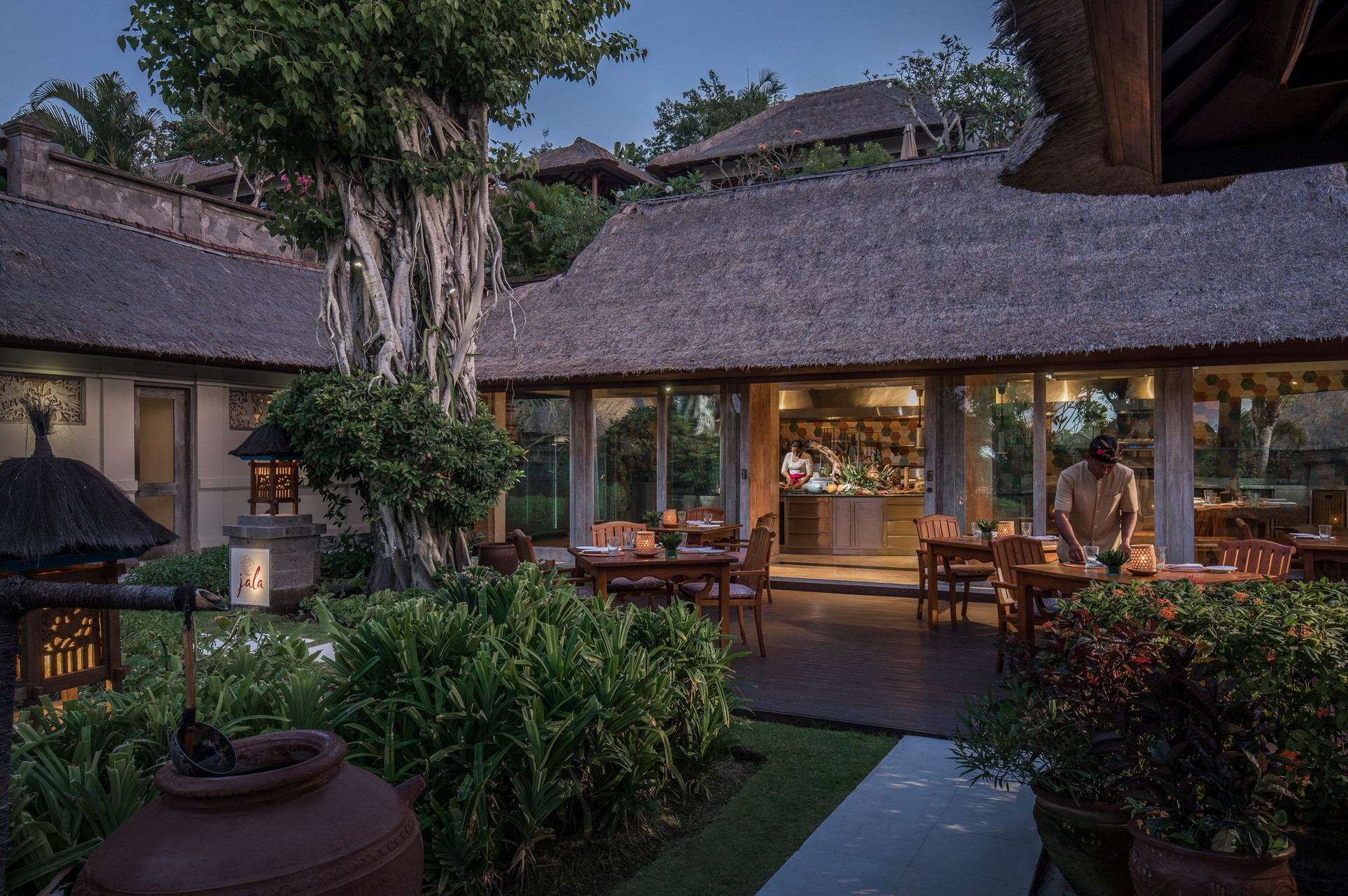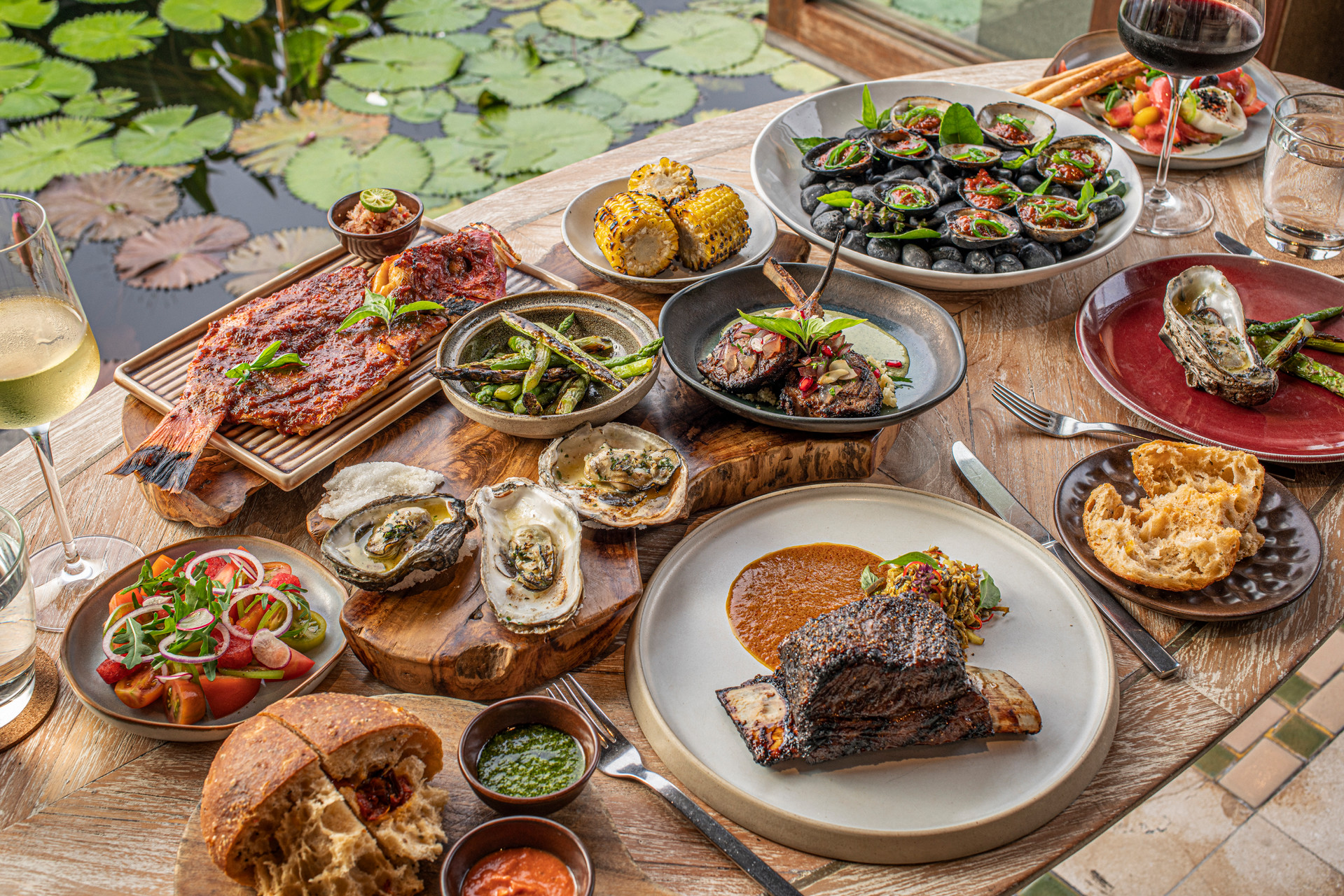During a two-night stay at the eight-key, greenery-clothed, and ocean-fronted hotel located in west Bali, dinner was always at a communal table with other guests. Finding common topics among strangers can be awkward, but the delicious food easily fueled conversations. There were grilled mushrooms, stir-fried morning glory, zucchini blossom tempura, and an assortment of sambals. Cocktails were made of local rum and gin, and desserts were the likes of dumplings stuffed with grated coconut and palm sugar and served with organic chocolate ice cream on the side. It was refreshing to experience a vegan meal solely made of plant originals and not a single lab-made substitute.
Imagine going vegan in Bali, the land of the crackling babi guling. Sounds impossible, but at Lost Lindenberg, their plant-based menu is actually a respite from meat-laden feasts.
Lost Lindenberg is among the Considerate Collection of hotels under the Small Luxury Hotels of the World (SLH) group that support the local community through their sourcing. Lost’s menu is backed by backyard herbs and vegetables, along with produce from Bali’s permaculture producers, such as heirloom tomatoes from the central-north region of Bedugul and organic ice cream made by an independent maker in Canggu. Another is six-room boutique Desa Hay, located near Canggu, where western and Indonesian comfort food – think moreish mac and cheese, salmon rosti, mie goreng, and roasted local duck – is mostly prepared with fruits, vegetables, meats and seafood farmed and caught locally, while steak and cheeses are sourced outside of Bali.
Strong local connections also form the backbone of dining at Viceroy Bali, another SLH hotel, which opened in 2005 and is now led by siblings Amanda and Anthony Syrowatka who took over from their parents. Their Apéritif Restaurant and Bar has been synonymous with locavore fine dining since it opened in 2018, and the new tasting menus feature oysters and poultry from Bali and Tokusen wagyu from Sumatra, alongside imported produce, such as Hokkaido scallops, Kagoshima A5 wagyu beef, and Canadian lobster. Almost all the vegetables, herbs, and spices are from the region or grown onsite at the hotel.
 Apéritif Restaurant and Bar at Viceroy Bali
Apéritif Restaurant and Bar at Viceroy Bali
 Beef carpaccio from Apéritif Restaurant and Bar at Viceroy Bali
Beef carpaccio from Apéritif Restaurant and Bar at Viceroy Bali
Executive chef Nic Vanderbeeken, a Belgian who has spent the last nine years building relationships with local producers, shared: “We focus on premium produce with touches of Indonesian flavors to showcase the philosophy of eclectic cuisine that allows diners to feel connected to our home in Bali.” The Hokkaido scallops, for example, are topped with a drop of spicy colo-colo, a condiment commonly found in Indonesia’s Maluku archipelago. The Tokusen wagyu is lightly roasted and sliced as a carpaccio, where the beef’s buttery texture is elevated by the acidity from pickled mustard seeds and wagyu fat vinaigrette.
 The spread at Home by Chef Wayan
The spread at Home by Chef Wayan
Chef Wayan Kresna Yasa, who was the former global executive chef and culinary director of Potato Head, is also bringing a modern spin to familial Indonesian dishes through his casual bistro, Home by Chef Wayan. He shared: “Many people falsely believe that Balinese food is spicy, cheap, fried, unhygienic, or unhealthy. Our food proves them wrong as it is made fresh daily from newly harvested local produce and is packed with nutrients and full of flavor.”
The gurita bakar, grilled octopus with tomato and chili relish, and ayam srosop, a roasted chicken leg in spiced curry broth and served with local vegetables, were just a few of the dishes that shone in their balance of salt, acid, and spice – elements that form the basic flavor foundation of Indonesian cuisine – yet were heartwarmingly comforting.
 Balinese restaurant Jala at Four Seasons Resort Bali at Jimbaran Bay
Balinese restaurant Jala at Four Seasons Resort Bali at Jimbaran Bay
When it comes to freshness, nothing quite beats the feeling of catching your own lunch. The Ocean-to-Table experience at Four Seasons Resort Bali at Jimbaran Bay began with a fishing trip in the morning, where we successfully reeled in a garoupa, a few white snappers, and a leather jacket. On the jukung-style traditional fishing boat, we had a typical fisherman’s tiffin lunch, which consisted of lemper (sticky rice with meat), lawar (a mixture of vegetables, coconut and minced meat), and jajan pasar (traditional Javanese cakes found in local markets).
Then it was a trip to the Kedonganan market with chef Surya Hadinata from the hotel’s Jala Cooking Academy, where he taught us how to pick out the freshest seafood, before we headed back to the kitchen of Balinese restaurant Jala to prepare five dishes, including Balinese fish soup, squid and long bean salad, and a steamed pumpkin cake. Our freshly caught fish were expertly sliced and marinated with salt and pepper before they were grilled. Mixing, chopping, and frying in the heat of the kitchen made us appreciate the amount of effort that went into our Taste of Bali dinner at Jala the night before. It had begun with a traditional hand-washing ceremony before the dishes were served, redolent of the typical Balinese spices – turmeric, galangal, chili, lime, etc – and an additional side of chili to dial up the heat.
 A Balinese feast at Four Seasons Resort Bali at Jimbaran Bay
A Balinese feast at Four Seasons Resort Bali at Jimbaran Bay
At the hotel’s Telu Bar, we picked herbs from the garden to make zero-waste margaritas, whose recipe consists of syrups made from leftover lemon and lime peels and pulp, and a house-infused orange arak. The bar’s new arak cellar showcases in-house infusions made with Balinese produce like strawberries and snakefruit, as well as local labels that are so limited in production that they are rarely exported.
With so much to savor, ensure an open mind and an empty stomach the next time you head to the island of gods.











 Back
Back
